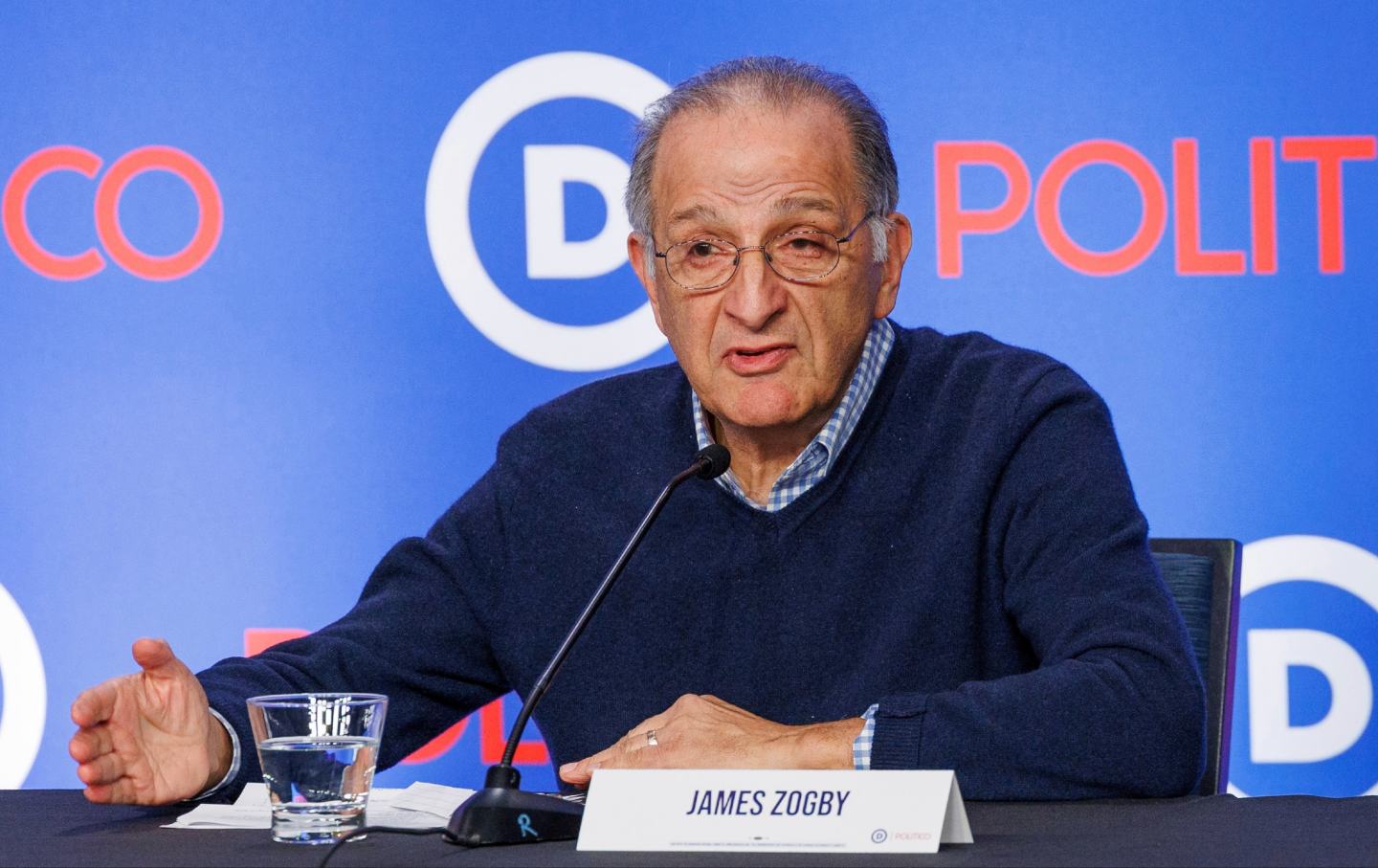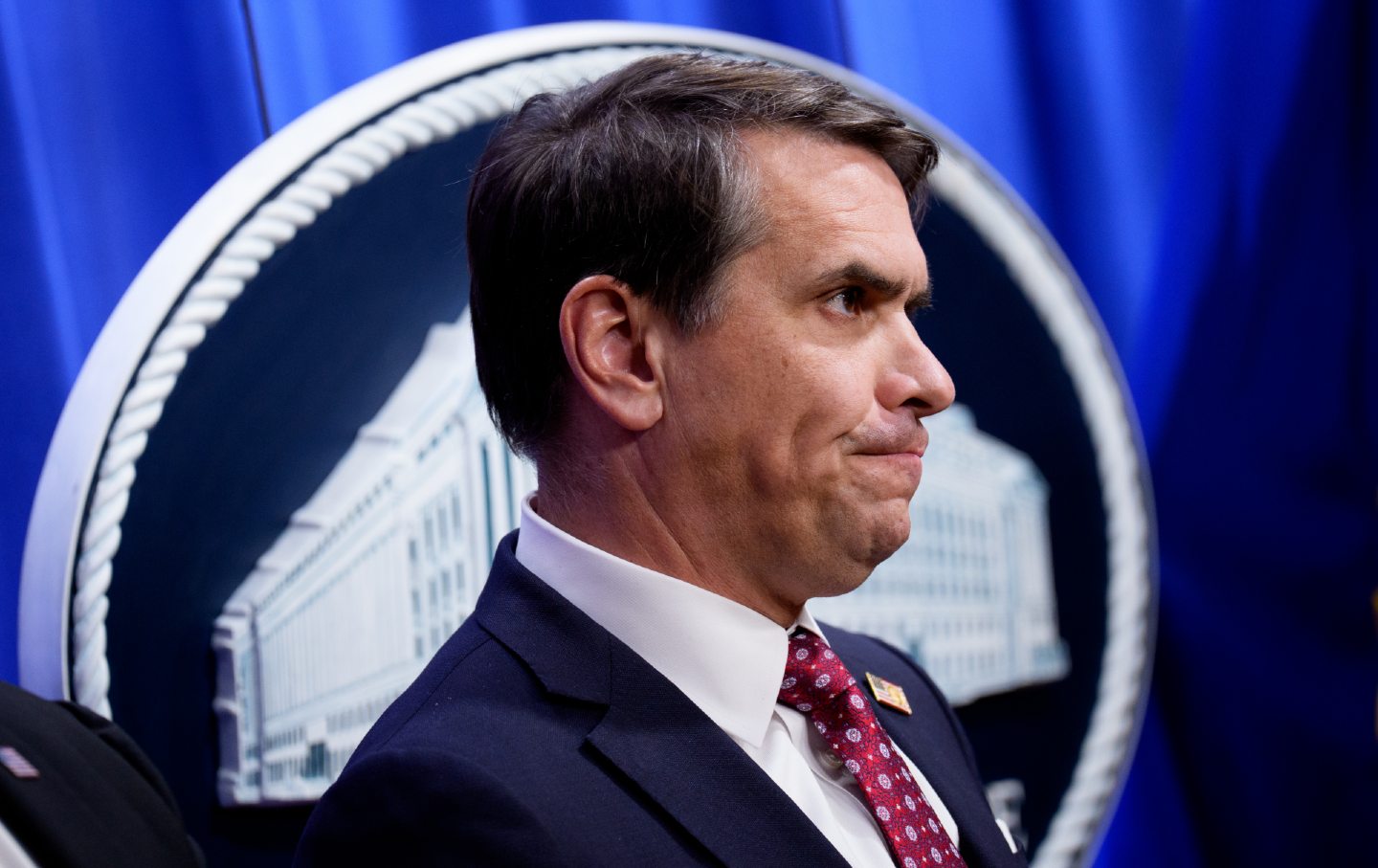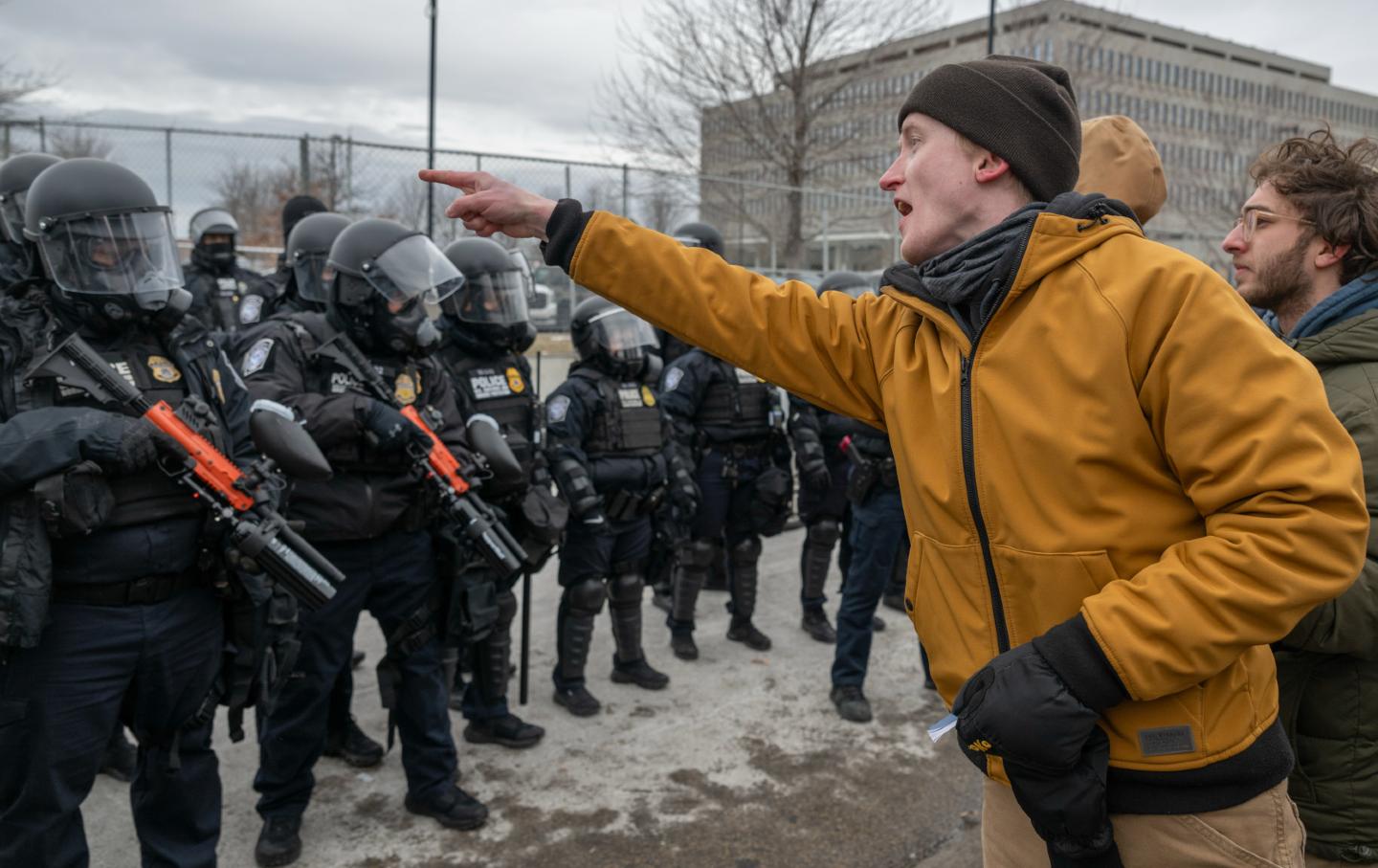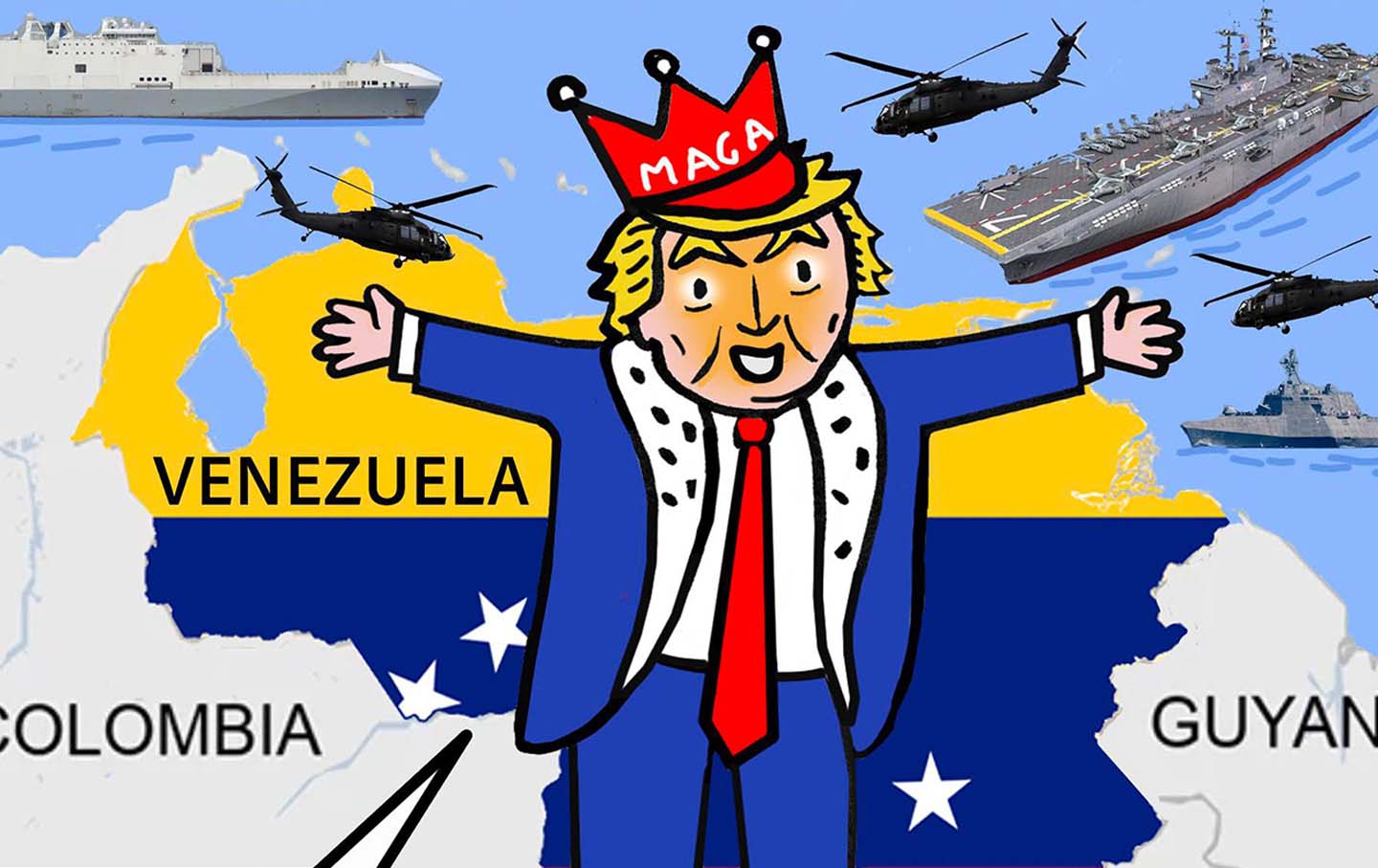James Zogby Wants to “Democratize the Democratic Party”
The progressive stalwart is running for DNC vice chair to “recreate the organic link between people and the party.”

James Zogby speaks at a forum with candidates to become the Democratic National Committee’s vice chair in Detroit on January. 16, 2025.
(Andrew Roth / Sipa USA via AP)James Zogby wants the Democratic Party to become, well, democratic. Instead of simply bowing to the demands of the major donors, highly paid consultants, and political power brokers who preach caution in a time of urgency, the veteran Democratic National Committee member and longtime ally of the Rev. Jesse Jackson and US Senator Bernie Sanders wants to transform the party so that it can reengage with the voters it needs to win elections.
This mission isn’t a new one for Zogby, who for years has advocated for reform of the party. But if he is elected to a DNC vice chair position in voting this Saturday, Zogby believes he will be in precisely the right position to demand the changes that so many Democrats say are necessary.
Many of the reforms Zogby supports are structural. But at the heart of his advocacy is a passion for giving grassroots Democrats a greater voice in a party that, he says, should be willing to take bold stands that speak to the values of its base voters—and to the millions of Americans who feel that their needs, and their ideals, have been overwhelmed by the influence of the big donors and corporate interests that dominate both major parties.
That’s not just the right thing to do, says Zogby. It’s a smart approach to politics that can give grassroots activists a deeper sense of connection to a party that needs their energy and enthusiasm as it takes on not just Republicans like Donald Trump but a political process that too many Americans see as disconnected from their lives and their concerns.
“We have to recreate the organic link between people and the party—make it a viable entity, so that people say: ‘I want to be a part of that,’ and ‘I can be a part of that,’” explains Zogby, who is one of more than a dozen candidates seeking a trio of at-large DNC vice-chair positions on February 1, the same day the party will elect a new chair and other top officials. Positioning himself as a candidate who knows both the reforms that are needed and the way to implement them, Zogby has won support from leading progressives, including Sanders, Jackson, former Congressional Progressive Caucus chair Pramila Jayapal, and Minnesota Attorney General Keith Ellison, who mounted a strong bid for DNC chair in 2017.
Zogby has earned that support because he wants Democrats to stop deferring to deep-pocketed donors and consultants, adopt policies that support the efforts of grassroots activists to strengthen the party in the states, and answer calls from its base for the DNC to stand in solidarity with working-class Americans and in support of civil rights and human rights.
“The first thing you have to do is change the way the party operates so that it becomes democratic,” says Zogby, “so that it becomes a place where 448 people from around the country can come together and have their views known, and reflect views of people they know, rather than being treated as props at meetings—who [are expected to] vote on decisions that have already been made [by party power brokers], which is how it operates now.”
Democrats are reeling after the setbacks they experienced in the 2024 presidential and congressional elections. Plenty of DNC candidates are running as reformers. But Zogby, who has been an active Democrat since he was a child handing out leaflets for John F. Kennedy in the ethnic neighborhoods of Utica, New York, brings decades of experience as a proven campaigner for change within the party.
A savvy strategist and organizer, who for many years has served as president of the Arab American Institute, where he has been one of the country’s most persistent advocates for Palestinian rights and Middle East peace, Zogby has counseled Democratic presidents and vice presidents. President Obama appointed him to the United States Commission on International Religious Freedom. Under the leadership of former president Jimmy Carter, Zogby served as an election monitor in Palestine in 1996.
Zogby has spoken at Democratic National Conventions, led platform debates, and helped to organize historic presidential campaigns—serving as a deputy campaign manager for Rev. Jackson’s 1984 and 1988 bids, and as an adviser to the campaigns of Al Gore in 2000, Obama in 2008 and Sanders in 2016. He was a key member of the Unity Reform Commission that after the 2016 election brought together top backers of Sanders and Hillary Clinton to open up the party’s nomination processes.
Few Democrats know more about the DNC than Zogby, who has been a member of the body for 32 years, served for 16 years on its executive committee, cochaired the resolutions committee for 11 years and cochaired its Ethnic Council for a dozen years. Yet he has always been a reformer, and often a dissenter—championing efforts to diversity the membership of the committee, advocating for internal transparency and accountability, and telling fellow DNC members that they must be bolder in order to deliver the moral clarity and political vitality that’s needed to connect with the great mass of voters who express frustration with the two major parties.
Famously, Zogby advocated in 2003 for the committee to take a clear stand against the Bush administration’s rush to war in Iraq. “I argued, quite simply, that we should not send our young men and women into a country whose history and culture we do not understand, and without being clear about the costs, commitment and terms of engagement,” recalls Zogby. “But, boy, they did not want to hear it.”
Popular
“swipe left below to view more authors”Swipe →When he proposed an anti-war resolution for consideration by the DNC, he gave the committee a chance to get on the right side of history—and of the sentiments of the tens of millions of Americans, especially young people, who refused to accept Bush’s rejection of diplomacy. But the resolution was never taken up. Why? The word came down that several leading contenders for the party’s 2004 presidential nomination did not want to take such a firm stand—even as millions of people were in the streets opposing the rush to war, and grassroots Democrats across the country were organizing against Bush’s folly.
Zogby’s seen the same pattern play out when rank-and-file Democrats have tried to reform the party. He was a leading backer of an unsuccessful move to ban dark money in primaries. And he has a long history of pushing the DNC to speak with a clear voice on policy issues. Like Sanders, he’s been frustrated by the party’s caution on a host of domestic economic issues that concern working-class voters. And he’s sought to get the party to embrace progressive foreign-policy initiatives, such as former US Representative Barbara Lee’s push to overturn Bush-era authorizations for the use of military force.
Frustration with the DNC has boiled over since the 2024 election and, suddenly, Zogby is hearing widespread discussion of reforms he has long championed: steering resources to state parties, cleaning up the funding rules for party primaries, empowering young activists within the party and in communities across the country, and embracing smart new approaches (and technologies) for voter outreach rather than diverting every available penny into billion-dollar television “air wars.” A longtime advocate for greater funding of state parties, he’s also promoted “opening up positions from central committees down to the precincts, so that there are networks that allow us to bring young people and those who feel disenfranchised by the party into the party.”
“These are the kind of things that I’ve been talking about for years, and now a lot of other people are talking about,” explains Zogby. “So, in some sense, there’s a victory here—a Jackson-like victory. If everybody’s talking about the issues that I’ve been talking about, that’s a win.”
So why is Zogby bidding for the vice-chair position? Because, he says, he sees an opening to finally democratic the Democratic Party. People recognize, says Zogby, that it’s time to “democratize the Democratic Party” by breaking the grip of the donors and consultants who “operate with a playbook that has been [discredited]. They are living in a world that doesn’t exist. They are providing ‘solutions’ that don’t address the problems the party is facing. I just don’t want another election to happen without reforming the DNC. The stakes are too big.”
More from The Nation

A Trump Administration Official Says It Won’t Investigate the Killing of Renee Good A Trump Administration Official Says It Won’t Investigate the Killing of Renee Good
Deputy Attorney General Todd Blanche makes clear that the Department of Justice won’t look into the death of Renee Good—but that won’t stop Minnesota from investigating.

Martin Luther King Jr.’s Dream: Love Against Racism Martin Luther King Jr.’s Dream: Love Against Racism
As Dr. King reminded us, “Hate cannot drive out hate; only love can do that.” His words continue to call us toward justice, compassion, and the power of love to confront racism.

It’s Official: The People, Not the Politicians, Are Leading It’s Official: The People, Not the Politicians, Are Leading
In this week’s Elie V. US, our justice correspondent explores the fecklessness of the Democratic Party, MAGA racism, and fighting despite unwinnable odds.

The Week of Colonial Fever Dreams From a Sundowning Fascist The Week of Colonial Fever Dreams From a Sundowning Fascist
The news was a firehose of stories of authoritarian behavior. We can’t let ourselves drown.

Self-Appointed King of Venezuela Self-Appointed King of Venezuela
The United States attacks Venezuela and captures President Maduro. Trump claims that the US will “run” the country for oil interests.



